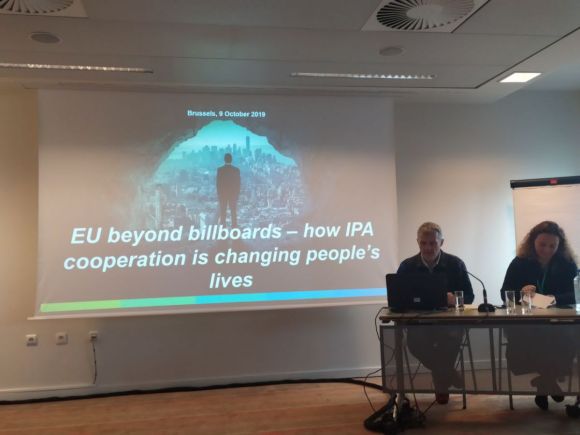
It is often thought that the action of the European Union ends within its own borders and that positive effects are limited exclusively to the 28 member states. The IPA (Instrument for Pre-Accession Assistance) proves the opposite. This tool has the goal of developing and transforming individual sectors, bringing them to the average EU standard. Today’s workshop called “EU beyond billboards – how IPA cooperation is changing people’s lives” aims to show four project examples that have brought positive changes in the regions and communities, demonstrating that behind EU billboards, there is not just a lot of work, but also many positive results.
The projects discussed were:
1) Regional Centre for advanced laser therapies in Ophthalmology - RECALT (Interreg-IPA CBC Romania-Serbia Programme)
In the first project, thanks to Valeria Mocanu’s presentation, it became clear how cross-border cooperation can improve people’s lives on a medical perspective. With a budget of 1.905.000 euro, the project saw the cooperation between Timisoara University of Medicine and Pharmacy Victor Bebes in Romania and the Municipality of Nova Crnja in Serbia. Both sides got new equipment for the screening and treatment of retinal diseases and also had trainings for family doctors and medical students to prevent and recognize medical issues. Thanks to this cooperation more than 10 300 medical tests for diabetes were made and 600 people were able to use free eye surgery services. Special attention was brought to disadvantaged people and Roma communities.
2) P.O.W.E.R. -People with disabilities: new opportunities for work, employability, professional rehabilitation project (IPA CBC Bosnia and Herzegovina–Montenegro Programme);
This project was financed by the EU-IPA cross-border program, Caritas Italy and local Government in the area of employment and employability of people with disabilities. Caritas BiH project manager Zlatko Maric presentation highlighted the big contribution this project has made to both countries and communities not only by sharing knowledge but also with the creation of common recommendations and policies. The main message of this cooperation is that people with disabilities have a right for work and employment and to do so education should not only adapt to their needs but give to them soft skills usable in the job market. Internships, job fairs for disabled people and media campaigns were made with the goal to change people’s perception of disability.
3) TOGETHER: Common cultural and historical heritage beyond the borders (Interreg-IPA CBC Bulgaria–Turkey Programme).
Another example of cross-border cooperation can be seen in the improvements in two historical sites: Aquae Calidae-Therma in Bulgaria and Rock monastery St.Nicolas in Turkey. Vesela Hristova, Aquae Calidae manager, presented how EU funds helped in the protection and promotion of this site located in Burgas. Not just archaeological structures were restored and preserved, but footbridges were also constructed for the tourists. Due to the limited exhibition space, not all the Acqua Calidae finds can be shown, therefore, through the digitalization of cultural valuables, they are now available to anyone thanks to the creation of a website.
4) Cross-border Flood Protection and Rescue project (IPA CBC Serbia–Montenegro programme)
Presented by Veselin Šturanović, FORS Montenegro Executive Director, the Cross-border Flood Protection and Rescue project between Montenegro and Serbia aimed to reduce the risks of disasters caused by natural hazards in Serbia and Montenegro. Ended in 2014, just one month before the worst floods that hit Serbia in a century, the project impacted the communities not only giving them equipment but also through rescuers trainings and public awareness campaigns. Given that natural hazards are unpredictable, this cooperation proved that having a Disaster Risk Reduction system helped the communities and saved people’s lives.
Written by: Jovana Kuzman (Serbia)
Edited by: Iskra Tsankova (Bulgaria)



